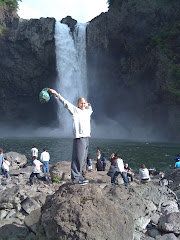
I found Andre' Breton's Nadja to be riddled with pearls of wisdom; but, illusive wisdom that was swirled around and not exactly forthcoming. Almost as if he, without having a plan, sat down and wrote whatever popped into his mind. And, it is this visual - of an artist hunkered over a table with pen to lip, spark of thought, and the continual scratch of pen - that made me want to wade through his ostensibly random and compiled pearls - keeping the very best for myself.
And for some reason, I feel the need to randomly list those thoughts of Breton's I found most interesting: so, here they are without method on my part, and with no call to action on your, the reader's, part:
It is our particular aptitudes which will define our own, unique experience of the day-to-day. Thus, no one individual's experience will mirror another's.
How are mind arranges thoughts and actions is far more interesting, according to Breton, than how our mind regards the arrangement of certain objects or events. Thus, the dream state is particularly interesting because it is our brains synthesizing and arranging what it has experienced.
authenticity is sublimely important. Breton advocates it for himself and for others. Be you! And, furthermore, write about yourself - not about characters who are like you. For that only muddles and polishes over the rough edges that define and make an individual who they uniquely are. Live in a glass house. Sheltering oneself from the world, and in turn sheltering the world from all that makes us who we uniquely are, is not honorable.
He is a judger it would seem. But, in doing so, he is discovering what he is not - and who he does not want to be - his "ghost" form. He is also discerning his own individual life's purpose.
He takes the time to focus on facts - facts which may appear to be pure observation to most individuals, but which to Breton are possible signals. And with this thought random, purposeful appearance of Nadja in the text is set up.
I love how he just randomly writes, stating "I shall discuss these things without pre-established order, and according to the mood of the moment which lets whatever survives survive" (23).
Breton's banal images evoke deep thought. Very surrealist.
They, though, interrupt the reader's natural reading rhythm.
Breton, throughout the text, seems to be working out his everyday emotional reactions to everyday circumstances - thus, he has used Nadja as a way to catalogue his thoughts (without actually organizing or cataloguing anything)
Self-evaluation should be feared. It is inadequate.
It is as if Breton is making a point not to arrest meaning from what he has written. He would like the pages with his words on them to hit the floor - never to be diagnosed, only to read, categorized, and filed away in our dream state. To perhaps be revisited but only on a subconscious level.
And this concludes my random thoughts regarding Breton's own random thoughts. Hopefully they too will be meaningless and murky.




No comments:
Post a Comment